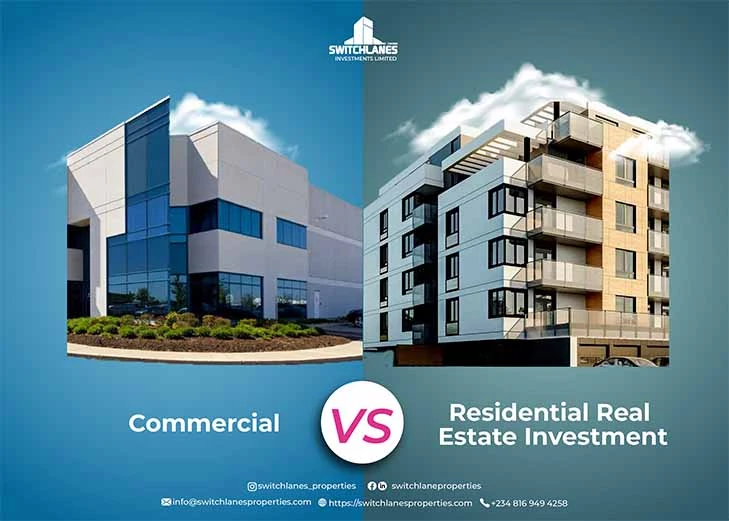Residential and commercial real estate are the two divisions of real estate.
They (Commercial vs Residential Real Estate Investment) are comparable to a coin’s two sides. Investment in one aspect of real estate therefore complements investment in the other. That is Investing in Commercial Property vs Residential Real Estate Investment can actually complement each other. The explanation is that people need a place to live in order to work in an office. It takes effort to decide which area of real estate to invest in whether investing in commercial real estate or mixed commercial residential property.
The process of transforming land for the purpose of erecting office and residential buildings is known as real estate development. This is true because real estate development determines how land will be used in the future and how homes and jobs will be distributed in relation to it. It offers public planners a tool to control urbanization as a result.
REAL ESTATE FOR HOUSES – Is It Better to Invest in Commercial or Residential Property?
Real estate for residential use includes purchasing, renovating, and selling houses. There are various reasons why people buy and sell real estate, but buyers and sellers make up the real estate market and decide whether to invest in residential vs commercial apartments. Popular questions among residential vs commercial real estate investment is: “Can you do both commercial and residential real estate? or is it better to invest in commercial or residential property?, What makes more money commercial or residential real estate?”
Some individuals pursue it as an investment. However, there are numerous ways to actively invest in real estate, but most of them include either residential or commercial property. Additionally, there are distinctions between residential and commercial real estate investing, and each has benefits and drawbacks.
BENEFITS OF INVESTING IN REAL ESTATE FOR RESIDENTS
Almost anyone may start investing in residential real estate because to the relatively inexpensive start-up costs. The profit margin between your buy price and sale price is how you will be paid if you are investing in residential real estate with the intention of flipping it.
However, because it’s quite simple to find paying tenants, many people purchase residential property and turn into landlords.
The drawbacks of residential real estate investing could include deadbeat renters, property management duties as a landlord, and other difficulties.
Residential real estate includes all single-family homes and one- to four-family rental properties. For financial purposes, residential real estate also includes condominiums and cooperative apartments.
A buffer against inflation is one advantage of real estate investing. During times of strong inflation, your rental income and property value both increase significantly. Real estate investors like inflation since it increases their cash flow as a result of rising living costs.
Whether you have prior investing experience or are just starting started, real estate is not a short-term investment strategy. Contrarily, the advantages of real estate investing include the capital asset (also known as land) appreciation over time. In other words, your house will be significantly more valuable in 30 years, which is why investors are committed to the long term.
Also Read: Rainstorm effects on Nigerian residential buildings
REAL ESTATE FOR BUSINESS
What is commercial real estate investing? Typically, commercial real estate consists of land or structures designed to make a profit. Investment or income property are terms that are frequently used to describe commercial real estate.
Rental homes and buildings with five or more units are also considered to be part of commercial real estate. However, office, retail, and industrial-style buildings make up the majority of commercial real estate.
People with a lot of money, business expertise, or business education frequently get interested in investing in commercial real estate.
BENEFITS OF COMMERCIAL ESTATE INVESTING
In commercial real estate, you typically purchase properties that are anticipated to generate income and profit from the long-term leases of tenants.
However, because commercial buildings are more expensive than residential properties, commercial real estate investing often has substantially greater startup costs than residential real estate investing.
See also: The benefits of home ownership as an investment
A deep-pocketed investor-backer or lender is typically required when investing in commercial real estate. When granting loans for commercial property, banks might be challenging.
Commercial real estate, on the other hand, can produce considerable income or sale profits if it is wisely purchased, maintained, or sold.
It is obvious that commercial estates with more space and more tenants to fill their various sectors achieve loftier profits with an improved position in the market. It is an excellent undertaking because of the consistent cash flow, which generates periodic revenue that exceeds the rent for the space.
In contrast to residential investors, commercial investors have the potential to make an increased profit, with the lessee responsible for paying the cost of maintenance, rates, and repairs on the property when the ongoing costs are written into the commercial lease agreement. Maintenance is one of the main advantages of investing in commercial real estate over residential real estate.
Level of Engagement – Residential vs Non Residential Property
Depending on whether you want to flip the property, become a long-term investor, or become a landlord, the level of participation you need to have in real estate investing may vary.
Many people acquire houses, renovate them over the weekends, and then sell them. The language used in purchase and lease agreements for commercial real estate is also quite foreign.
Residential real estate is easier to finance and manage than commercial real estate, but typically requiring more hands-on involvement.
People increasingly prefer to work and play close to each other as the world develops quickly.
Therefore, investing in any sector of the market will always be profitable.
Hot Properties That Are Currently On The Market



Commercial vs Residential Real Estate Salary
Whether a real estate agent specializes in the selling of commercial or residential properties, their annual pay is heavily influenced by the specific sales they make in a given year. Despite the slower sale turnover in the commercial real estate sector, commercial agents have the ability to make a significantly greater wage because their commissions are often higher overall. This is due to the greater initial costs associated with commercial properties. Since commissions are calculated on a percentage basis, or the take-home profit received by agents, they reflect these higher pricing.
Residential real estate brokers typically work for other brokerages and receive fewer commissions than commercial agents, which results in a lower average pay. Despite this, the residential real estate sales cycle is substantially quicker, and entering the field has fewer barriers. This means that if the agent is knowledgeable, they may occasionally make more money than the industry standard.
Commercial vs Residential Real Estate Reddit
For me, the key difference is between gross leasing and net leasing. My real estate performs better as a leveraged, inflation-protected bond and has less management overhead the more expenses that are passed on to the tenant. Longer vacancies (which are best balanced with longer leases) and TI allowance are disadvantages of nonresidential. This drawback acts as an entry barrier, keeping out less well-capitalized investors.
What are the types of commercial properties?
What sorts of commercial real estate are there?
Office. Two types of office buildings are typically distinguished: Retail. Urban or suburban. The properties that house the shops and eateries we frequent are classified as retail. Other types of properties include industrial, multifamily, hotel, and special purpose.



